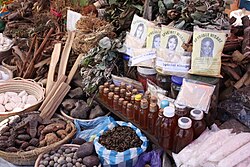doctor
Welcome to our info site !

Traditional medicine
(also known as indigenous medicine or folk medicine) comprises medical aspects of traditional knowledge that developed over generations within the folk beliefs of various societies, including indigenous peoples, before the era of modern medicine. The World Health Organization (WHO) defines traditional medicine as "the sum total of the knowledge, skills, and practices based on the theories, beliefs, and experiences indigenous to different cultures, whether explicable or not, used in the maintenance of health as well as in the prevention, diagnosis, improvement or treatment of physical and mental illness".[1] Traditional medicine is often contrasted with scientific medicine. More about Traditional medicine

Traditional Medicine
Traditional medicine, as defined by the World Health Organization, is the sum total of the knowledge, skills, and practices based on the theories, beliefs, and experiences indigenous to different cultures, whether explicable or not, used in the maintenance of health as well as in the prevention, diagnosis, improvement, or treatment of physical and mental illness. Some traditional medicine systems are supported by huge volumes of literature and records of the theoretical concepts and practical skills; others pass down from generation to generation through verbal teaching. To date, in some parts of the world, the majority of the population continue to rely on their own traditional medicine to meet their primary health care needs. When adopted outside of its traditional culture, traditional medicine is often referred as “complementary and alternative medicine.” Among others, the most widely used traditional medicine systems today include those of China, India, and Africa. In this chapter, the Chinese, Indian, and African systems of traditional medicine are described. More

Legislation on Medicinal Plants in Africa
Africa is endowed with rich and high endemicity of plant biological diversity, and a number of species are used as traditional medicines. Many African countries, working within the guidelines of the Convention for Biological Diversity and the Global Strategy for Plants Conservation, have developed legislation for the management of plant biodiversity, covering forestry, environment, food, agriculture, access and benefit sharing, intellectual property rights, registration of herbal medicines, and other areas. Many countries have signed the Convention on Biological Diversity, though some have not. However, enforcement of these laws in almost all countries is very weak; there is a lack of harmonization at the national level, coupled with high border porosity, which leaves openings for biopiracy. The Kyoto Protocol 2010 provides a good opportunity for African countries to harmonize legislation governing the exploitation of medicinal plant biodiversity in a manner that is beneficial to their countries. This chapter reviews the status of some of the legislation in African countries, highlighting some specific country plant biodiversity situations; for each of the countries mentioned an attempt has been made to give information on the available capabilities for the evaluation of the safety, efficacy, and quality of herbal medicines and regulations on registration of herbal and traditional medicines. It is recommended that African countries continue to strengthen legislation related to medicinal plants; strengthen their capacity for safety, efficacy, and quality evaluation; and embark on commercial cultivation of medicinal plants to benefit from the expanding global market of herbal medicines. More
Herbal medicines
Herbal medicines are those with active ingredients made from plant parts, such as leaves, roots or flowers. But being "natural" doesn't necessarily mean they're safe for you
to take.
Just like conventional medicines, herbal medicines will have an effect on the body, and can be potentially harmful if not used correctly.
They should therefore be used with the same care and respect as conventional medicines.
If you're consulting your doctor or pharmacist about health matters, or are about to undergo surgery, always tell them about any herbal medicines you're taking.
More